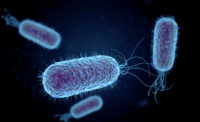The USDA’s Food Safety and Inspection Service has made it very clear that they are going after Salmonella.
I pulled the CDC outbreak investigation reports and compared them to the USDA FSIS recalls. Some interesting statistics. From 2017-20, there were seven multi-state foodborne outbreaks associated with meat or poultry for Salmonella. In contrast, during the same period there were 10 recalls of meat and poultry products due to Salmonella contamination.
Meat and poultry accounted for 23% of multi-state foodborne outbreaks associated with Salmonella during the same period. In total for all products, 65 people died from Salmonella. While 65 people out of more than 300 million may be statistically invalid, especially when you think about the number of meals that were consumed during that period, I agree it is still too many. In almost all cases, safe handling instructions were not followed and there was cross-contamination or other factors.
It was interesting to note that there were no foodborne outbreaks or recalls for Salmonella in 2020.
During the five-year period (2017-20) you had a .000019% chance of dying from Salmonella.
So, what do all these number mean?
We have a very safe food supply!
A lot of what FSIS is talking about regarding Salmonella is not going to work for small poultry harvesters and may ultimately put them out of business. The small processors typically don’t own the poultry that they harvest and don’t have the ability to control the incoming load on the birds. While many small farms are part of the National Poultry Improvement Program, many are not. It would be beneficial if FSIS and the folks over at APHIS who are involved in NPIP would get together to develop a streamlined standard that FSIS would accept concerning Salmonella. That way the owners who are part of NPIP could have their birds harvested without an undue burden that FSIS appears to be leaning towards.
For our larger producers that are vertically integrated it’s not as easy as snapping their fingers and Salmonella goes away. They have put a lot of time and effort into controlling Salmonella. It makes good financial sense. However, no one has come up with the proverbial silver bullet. While many point to Sweden as an example, even they have outbreaks.
As to Salmonella being declared an adulterant in breaded chicken products, most of our smaller clients that made those products just stopped, so it’s no longer available to their customers. Several of our larger customers are turning them into fully cooked products.
People power
I have written and spoken about the issues our industry faces in getting qualified food safety personnel. It hasn’t changed. Almost every facility we work with is short-staffed across all their teams, not just food safety. Thankfully there have been some creative ways created to assist in the food safety mission when needed to include increased automation for temperature checks, line speeds, etc.
There are also more training programs popping up to assist getting employees trained. Many of them are online, so travel isn’t required. Having said that, there is a high demand for onsite training around food safety, food defense, and humane handling. We encourage all our associations to provide this type of training during their annual conferences and conventions.
Appendix A & B
The new versions of Appendix A & B go live Dec. 14, 2022.
We strongly recommend you review your food safety plans as well as your cooking operations to make sure you follow the new versions. Some of the changes that we are seeing being made include:
- tracking come up time
- modifying smokehouse schedules
- and remote sensing of RH during cook jobs.
Traditional (but modern) smokehouses don’t have any issues, however, if you are using impingement ovens or old gravity-fed houses you need to take a critical look at your operation, you may need to make changes.
Highly pathogenic avian influenza
Its here again. The USDA’s Animal and Plant Inspection Service has even closed the border with Canada to wild waterfowl harvested by hunters stating, “Hunter-harvested unprocessed wild game bird meat/carcasses, originating from or transiting Canada, will not be permitted to enter the United States regardless of the Canadian province from which the bird was harvested.” They haven’t proposed any rules on the wild birds that fly across the border on their own, as in the 4 billion birds that migrate from Canada to the U.S. annually. The birds have us outnumbered!
Reviewing your biosecurity systems is crucial if you own your own birds. If you don’t, pass the information on to your customers. No one wants their flock depopulated!
Sanitary dressing of cattle and swine
We are seeing a focus on sanitary dressing procedures in several FSIS districts with the number of NRs and even NOIE’s founded on observations made by FSIS. This is in the absence of zero-tolerance failures or even any E.coli/STEC positives. If this happens to you, we suggest you appeal these actions.
Grants to expand the industry
We have all heard about all the proposed federal grants, Small Business Administration-backed loans, and state grants to increase productivity, diversity, and efficiency of the industry. They sound great! Unfortunately, many of our small clients couldn’t meet the deadlines to get everything in or missed required documents resulting in not getting access to the financial assistance our politicians are bragging about. I do expect more announcements as we get closer to the election this year. However, the agencies responsible for running these grants/loan programs are extremely short-staffed and take much longer than they should to act.
Crystal ball
There is going to be a lot more innovation in the sensor arena. I am aware of BAPI testing new remote sensing devices that will be used for food safety that will reduce reliance on a human being. There are several other companies doing the same thing in other arenas, to include development of rapid-confirmed tests for E.coli/STEC that will give you the confirmed positive or negative in less than eight hours.
Expect FSIS to become aggressive concerning Salmonella. As an industry, we need to adopt a commonsense approach to controlling it before FSIS feels compelled to make new rules.
The litigators who are pushing to make Salmonella an adulterant in all products is going to continue their push. It is a huge potential revenue stream for them. We must push back collectively and individually!
Finally, we need to tell our story. As an industry, we produce some of the highest quality, safest products in the world!
Drew Lorenz is chief executive officer of We R Food Safety.
Sources
https://www.allaboutbirds.org/news/4-billion-birds-will-fly-through-american-airspace-this-fall/
https://www.cdc.gov/foodsafety/outbreaks/lists/outbreaks-list.html
https://www.cdc.gov/foodsafety/outbreaks/lists/index.html
https://www.fsis.usda.gov/food-safety/recalls-public-health-alerts/annual-recall-summaries





Report Abusive Comment